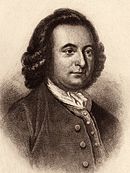Portal:Virginia/Selected biography/7
George Mason IV (December 11, 1725 [O.S. November 30, 1725] – October 7, 1792) was an American planter, politician and delegate to the U.S. Constitutional Convention of 1787, one of three delegates who refused to sign the Constitution. His writings, including substantial portions of the Fairfax Resolves of 1774, the Virginia Declaration of Rights of 1776, and his Objections to this Constitution of Government (1787) in opposition to ratification, have exercised a significant influence on American political thought and events. The Virginia Declaration of Rights, which Mason principally authored, served as a basis for the United States Bill of Rights, of which he has been deemed the father.
Mason was born in 1725, most likely in what is now Fairfax County, Virginia. He married in 1750, built Gunston Hall, and lived the life of a country squire, supervising his lands, family, and slaves.As tensions grew between Britain and the American colonies, Mason came to support the colonial side, and used his knowledge and experience to help the revolutionary cause, finding ways to work around the Stamp Act of 1765 and serving in the pro-independence Fourth Virginia Convention in 1775 and the Fifth Virginia Convention in 1776.
Mason prepared the first draft of the Virginia Declaration of Rights in 1776, and his words formed much of the text adopted by the final Revolutionary Virginia Convention. During the American Revolutionary War, Mason was a member of the powerful House of Delegates of the Virginia General Assembly but, to the irritation of Washington and others, he refused to serve in the Continental Congress in Philadelphia, citing health and family commitments.
Mason was in 1787 named one of his state's delegates to the Constitutional Convention and traveled to Philadelphia, his only lengthy trip outside Virginia. He was active in the convention for months before deciding that he could not sign it. He cited the lack of a bill of rights most prominently in his Objections, but also wanted an immediate end to the slave trade and a supermajority for navigation acts, which might force exporters of tobacco to use more expensive American ships. He failed to attain these objectives there, and again at the Virginia Ratifying Convention of 1788, but his prominent fight for a bill of rights led fellow Virginian James Madison to introduce one during the First Congress in 1789; these amendments were ratified in 1791, a year before Mason died. Obscure after his death, Mason has come to be recognized in the 20th and 21st centuries for his contributions both to the early United States and to Virginia.

